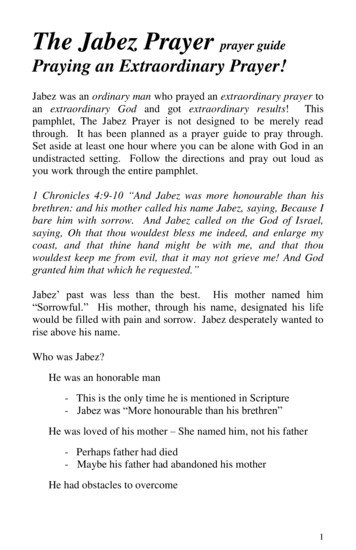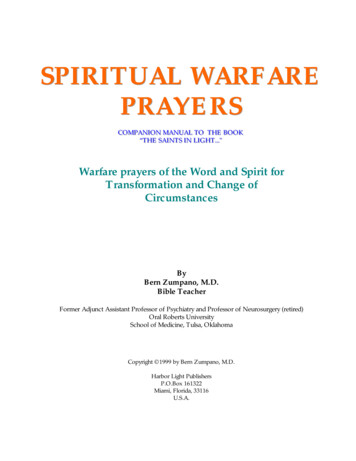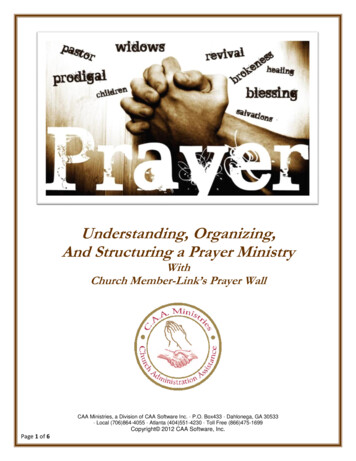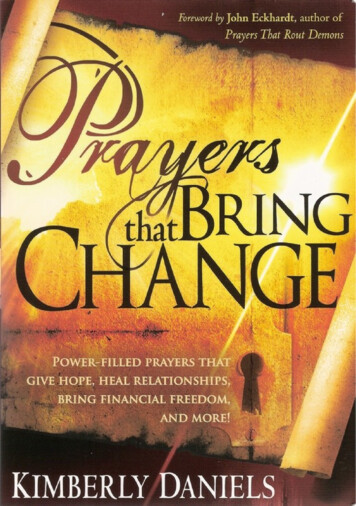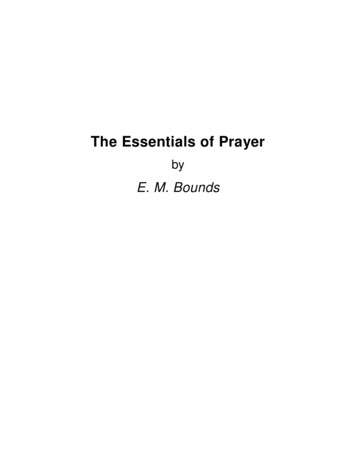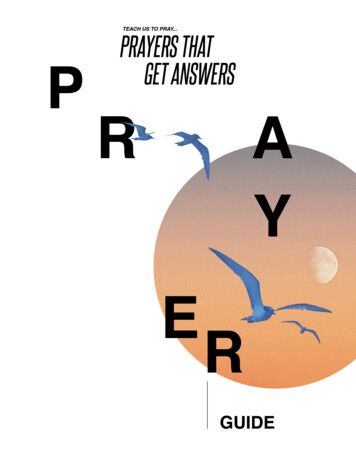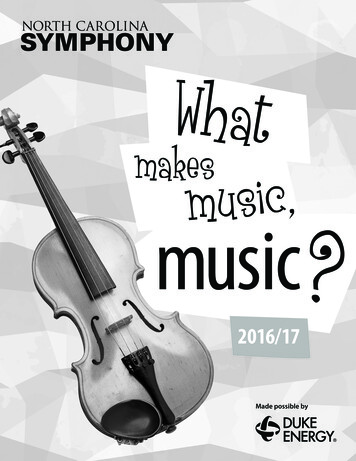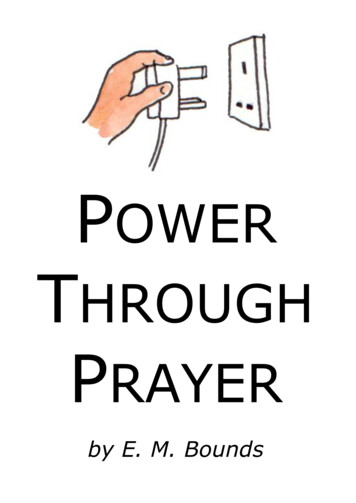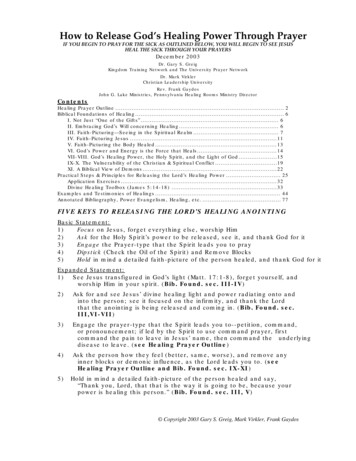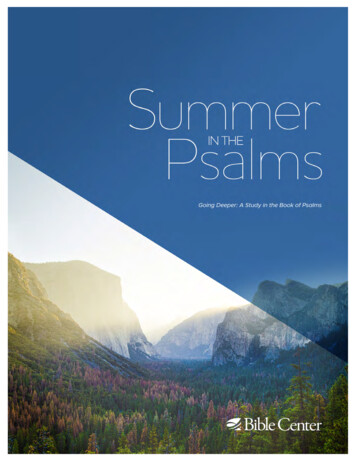
Transcription
Prayer is a foundation of the Christian life. Yet, if we are honest, it can be agreat area of struggle and dryness. The Psalms can reinvigorate ourpassion as God gives us words to speak. We learn how to go to our Fatherin weakness, desperation, anger, joy, and praise in the Psalms. We live thefull scope of the human experience in the presence of God. He is ready,willing, and able to hear your concerns, fear, hurt, and pain.The Psalms bring us into a chorus of worship, to our knees in desperation,and into a community that lives together in the presence of God. Read through the purposeand instructions on how to use this study. There is freedom in the amount of time, study, anddepth you choose to give to this study.Let’s ask God to move in our hearts and in our church to establish a growing movement ofprayer and praise!Beside you in the throne room,Mike Graham,Pastor of Group Life1
Table of ContentsI. Praying the PsalmsPurpose of the StudyHow to Use ‘Praying the Psalms’ StudyBackground on Psalms and Types of PsalmsWeekly ReflectionsPraying Through the PsalmsPsalms ChecklistPersonalized Psalm ThemesPsalm Blank Observation SheetsII. A Biblical Study of PrayerThe StruggleWhere are you in your prayer life?Prerequisites to PrayerThe Work of ChristThe Word of GodGod’s PromiseConditions for Answered PrayerPrayer in Light of Our Relationship with GodHindrances to PrayerPrayer Works!God’s Response to PrayerWhen do we Pray?Commands from the LordJesus’ ExamplePaul’s ExampleAdditional Biblical PrayersThe Need to 46484951How to Use the Prayer ChartPrayer Accountability Chart5253Broken and Unbroken People55Bibliography562
Praying the PsalmsGrowing our Prayer Lives, Using His WordsThe Nature of the Psalms“The book of Psalms has a unique place in the Christian Bible. One reason for its singular role,as noted by Athanasius is that most of scripture speaks to us while the Psalms speak for us”(Anderson, ix).“We recite this prayer of the Psalm in Him, and He recites it in us” (Peterson, 4).The Psalms will keep us centered on God. Our needs, fears, sins, and struggles will be seen andcommunicated in light of his power, goodness, and presence.The Psalms are “prayers that train us in prayer” (Peterson, 7).The Results of Praying the Psalms“God comes and speaks – his word catches us in sin, finds us in despair, invades us by grace.The Psalms are our answers” (Peterson 5). The language of the Psalms become our prayerlanguage. They guide our hearts and words through each moment of our life.“We don’t learn the Psalms until we are praying them” (Peterson, 12). We can pray the exactwords of the Psalms, or we can paraphrase them into our own words learning from God how topray.We plunge deep into the Psalms and they plunge deep into us. The thoughts and feelingsassociated with our best and worst moments of our life can be found in these prayers. ThePsalms guide us in how to respond to God. Our lives become centered around our fellowshipwith the Father as we seek him using the words he gave to us.1
Purpose of this StudyThe Psalms can be studied to increase our knowledge of God, our passion for his Word, todeepen our understanding of human struggles , but this study will be focused primarily on therole of the Psalms in teaching us how to pray.We seek to learn from the Psalms, pray through the Psalms, and grow in our intimacy with Godand others through the journey. Praying through the psalms influences our words directedtoward God and impacts our own hearts at the same time. “We recite this prayer of the Psalmin Him, and He recites it in us” (Peterson, 4).Therefore, our desire is to not only read and understand a Psalm, but to relate our life, ourstory, and the state of our heart to the author’s and pray with them to God. “We will not belooking here primarily for ideas about God, or for direction in moral conduct. We will expect,rather, to find the experience of being human before God exposed and sharpened” (Peterson,12). All of us have times of joy, sadness, thanksgiving, and even despair. The Psalms explore allof these emotions and give us an example of how to take our hearts (joyful, broken, orbleeding) before the Lord with openness, honesty, and hope.“We don’t learn the Psalms until we are praying them” (Peterson, 12).Common thoughts people have when they start praying the Psalms (Whitney, ch. 8). My mind doesn’t wander. My prayer was more about God and less about me. The time was too short. It seems like a real conversation with a real person. The psalm spoke directly to the life situation I am in right now, I thought more deeply about what the Bible says. I had greater assurance that I was praying God’s will. I prayed about things I normally don’t pray about. I prayed about the things I normally do pray about but in a new and different ways.2
How to Use this ‘Praying the Psalms’ StudyThis study guide provides multiple levels of depth that you can use in your study of the Psalmsand prayer. Pick from one of the options below. You can always try multiple options.1. Each week read through the Psalm from this Sunday’s sermon. Write down a coupleof your thoughts, observations, or prayers on the Weekly Reflections page. An additionalmethod from Donald Whitney is included for ongoing weekly reflections.2. Read through multiple Psalms per week, pray as you feel led, write down thoughtsin your Bible, and put a check next to it on your Psalm Checklist page.3. Create Themes. As you read each psalm, take the time to create a simple, memorabletheme for each. You can record your theme on your Personalized Psalm Themes page.Through different times of your life (praise, despair, thankfulness, broken relationships,joy, fear ) you can quickly look through your themes to find a psalm that can bring youguidance, insight, and comfort into each moment.4. Study each Psalm and pray through it. You will also have blank copies of the PsalmObservations page to fill out if you would like to go a little deeper with a psalm.Seek to Understand list what you learn about the Lord create a brief outline of the psalmStay to Pray Understand the position of the author (circumstances, stated purpose andsituation, expressed emotions ) Pick moments recent and distant that relate to the author. Pray through this psalm.5. Biblical Study on Prayer – a larger Scripture-wide study of prayer is located in the backif you would like to study the topic on a broader level.3
Background info on the book of PsalmsThe Nature of the PsalmsPsalms is one of the most loved and read books in the Bible. It was written over the courseof 1000 years. It functioned as Israel’s worship book, like a hymnal of today. It is the largestbook in the Bible. Psalms covers a multitude of life experiences and emotions. The book alsogives the nation of Israel songs to sing during certain celebrations and festivals. Much like ourChristian Christmas songs, there were psalms dedicated to different Jewish ‘holidays’ andceremonies.Psalms perhaps explores the scope of human emotion more than any other book in theBible. This book teaches us how to express our love for God, how to pray, and how to worship.Every Christian will greatly benefit from spending time in the Psalms. Make it your habit tospend time in prayer and in journaling while study the Psalms. This study is designed to fit theneeds of those who can only spend a little time in the Psalms or for those who want to wadeinto them and soak. The Psalms do not need to be read from beginning to end – use theinformation on ‘Types of Psalms’ to pick what you would like to read.Remember the Psalms are poetry and use many poetic devices. Contrast, synonym,repetition, parallelism, and other poetic devices are used. The resources listed below will helpthe reader understand the type of poetry they are reading.AuthorsDavid is the author of 73 of the Psalms. He writes these Psalms during many differentphases of his life – as a shepherd, as a king, as an adulterer. Asaph writes 12 psalms. Asaph is apriest who was in charge of the worship of the nation. The sons of Korah were a guild of singersand composers. Other psalms were written by Solomon, Moses, Heman, and Ethan.Break-up of the BookPsalms is broken up into 5 smaller books. These are divided up this way based upon date,authorship, and psalm content.Book I1-41Book II42-72Book III73-89Book IV90-106Book V107-150References The Treasury of David, by Charles Spurgeon (a devotional puritan classic)Psalms, by Willem A. VanGemeren in the Expositor’s Bible Commentary Series (a scholarlycommentary that discusses the nature of poetry)Psalms, by Gerald H. Wilson in the NIV Application Commentary (friendly to all users)Out of the Depths, by Bernhard Anderson (in depth look at the nature of the Psalms)4
Types of PsalmsIt is important for us to know the kind of psalm we are reading in order to understand whatthe psalmist is trying to communicate. It is also helpful when picking which psalm to study.There are several ways to label the different types of psalms. Detailed labels have been chosenfrom Out of the Depths, by Bernhard Anderson. Some psalms (along with parts of particularpsalms) will fall into multiple categories.Narrative Praise (Storytelling) – To remember the work of God leads to praise to God. Thesepsalms remind us to reminisce with prayers of praise on our lips. 78, 105, 106, 135, 136 (sections of 66. 71, 75, 77, 98, 107, 145)Community laments – Together we plead for God’s help, provision, and rescue. 12, 44, 58, 60, 74, 79, 80, 83, 85, 90, 94, 123, 126, 129, 137 (89)Individual laments – Prayers for God’s deliverance from despair, enemies, turmoil, and pain.We learn how to express our need and weakness before God through these psalms. They serveas good examples of how we are to humble ourselves before God recognizing our sin andhelplessness. 3, 4, 5, 7, 9, 10, 13, 14, 17, 22, 25, 26, 28, 31, 35, 36, 39, 41, 42, 43, 52, 53, 54, 55, 56, 57,59, 61, 63, 64, 69, 70, 71, 77, 86, 88, 109, 120, 139, 140, 141, 142 (27, 40)Psalms of Penitence – As believers we are forgiven sinners. We still constantly struggle withsin. We learn how to approach God in contrition and humility in these psalms. Even with fullforgiveness, confession and repentance are a proper response to revealed sin. 6, 32, 38, 51, 102, 130, 143Community songs of Thanksgiving – These are examples of how we can praise and worshipGod. Many of these psalms are filled with worship and adoration. We can use these psalms toexpress our love and thankfulness to God. 65, 67, 75, 107, 124, 136Individual songs of Thanksgiving – Examples of how we thank God for his personalinvolvement in our lives. 18, 21, 30, 32, 34, 92, 103, 108, 116, 118, 138 (40, 66)Hymns to God, who Created (Redeemed) Israel – Examples of how we can praise God for hisfaithfulness to his people. 100, 111, 114, 149 (66)Hymns to God, who Created the World – In wonder and awe we praise God as the Creator.Great psalms to use as prayers of praise! 8, 104, 148 (19, 95)5
Hymns to the Creator and the Ruler of History – God’s sovereign hand is seen overall. He is tobe worshiped for his transcendence over creation and his intimate involvement in the interworkings of his world. 33, 103, 113, 117, 145, 146, 147Covenant Renewal Liturgies – Israel’s sin is revealed and God call them back to faithfulness(similar to Joshua 24). These psalms can be used to inspire prayers for renewed faithfulness toGod for any of God’s children. 50, 81Enthronement Psalms – These hymns presuppose the centrality of Zion where Yhwh ismagnified in the praises of the people. 29, 47, 93, 95-99Psalms of the Davidic Covenant – These express an understanding of God’s relationship to thepeople including his historical deeds. A new beginning is seen in the raising up of David andZion as the central sanctuary. 78, 89, 132Royal Psalms – These psalms focus on the king as the central figure. Many Christological truthsare found in these verses, as David is a foreshadowing of the coming Messiah. 2, 18, 20, 21, 45, 72, 101, 110, (144)Songs of Zion – These psalms focus on the city (a place of divine presence) as the central focus.New Testament believers can use these psalms to cast their minds eye to the new heaven andthe new earth where we spend eternity in God’s presence. 46, 48, 76, 84, 87, 121, 122Songs of Trust – It is easy to be shaken living in a world of sin and suffering. Songs of trust giveus examples of how we can pray and express confidence in God during times of confusion orpain. 11, 16, 23, 62, 63, 91, 121, 125, 131 (27)Wisdom Psalms – These instruct the worshiper in the way of wisdom and righteousness. Theygive insight into determining God’s will and direction. 36, 37, 49, 73, 78, 112, 127, 128, 133Torah Psalms – Each of these psalms center around the beauty and precious nature of God’sWord. To love God includes loving his Word, these psalms give us words to express this love toGod in prayer and praise. 1, 19, 1196
Weekly Reflections on the Psalmsfrom the preaching seriesWeek 1 – PsalmHow would you summarize the psalm?What did you learn about God and your relationship with him from this psalm?What did you learn about prayer?Is there an area of your life or a time in your life where you can relate to the author’s situationand the feelings expressed in this psalm?Spend some time praying. Use the psalm to help you think of ways to express yourself to God.You can even simply pray through the psalm as though they are your own words.Week 2 – PsalmHow would you summarize the psalm?What did you learn about God and your relationship with him from this psalm?What did you learn about prayer?Is there an area of your life or a time in your life where you can relate to the author’s situationand the feelings expressed in this psalm?Spend some time praying. Use the psalm to help you think of ways to express yourself to God.You can even simply pray through the psalm as though they are your own words.9
Week 3 – PsalmHow would you summarize the psalm?What did you learn about God and your relationship with him from this psalm?What did you learn about prayer?Is there an area of your life or a time in your life where you can relate to the author’s situationand the feelings expressed in this psalm?Spend some time praying. Use the psalm to help you think of ways to express yourself to God.You can even simply pray through the psalm as though they are your own words.Week 4 – PsalmHow would you summarize the psalm?What did you learn about God and your relationship with him from this psalm?What did you learn about prayer?Is there an area of your life or a time in your life where you can relate to the author’s situationand the feelings expressed in this psalm?Spend some time praying. Use the psalm to help you think of ways to express yourself to God.You can even simply pray through the psalm as though they are your own words.10
Week 5 – PsalmHow would you summarize the psalm?What did you learn about God and your relationship with him from this psalm?What did you learn about prayer?Is there an area of your life or a time in your life where you can relate to the author’s situationand the feelings expressed in this psalm?Spend some time praying. Use the psalm to help you think of ways to express yourself to God.You can even simply pray through the psalm as though they are your own words.Week 6 – PsalmHow would you summarize the psalm?What did you learn about God and your relationship with him from this psalm?What did you learn about prayer?Is there an area of your life or a time in your life where you can relate to the author’s situationand the feelings expressed in this psalm?Spend some time praying. Use the psalm to help you think of ways to express yourself to God.You can even simply pray through the psalm as though they are your own words.11
Week 7 – PsalmHow would you summarize the psalm?What did you learn about God and your relationship with him from this psalm?What did you learn about prayer?Is there an area of your life or a time in your life where you can relate to the author’s situationand the feelings expressed in this psalm?Spend some time praying. Use the psalm to help you think of ways to express yourself to God.You can even simply pray through the psalm as though they are your own words.Week 8 – PsalmHow would you summarize the psalm?What did you learn about God and your relationship with him from this psalm?What did you learn about prayer?Is there an area of your life or a time in your life where you can relate to the author’s situationand the feelings expressed in this psalm?Spend some time praying. Use the psalm to help you think of ways to express yourself to God.You can even simply pray through the psalm as though they are your own words.12
Week 9 – PsalmHow would you summarize the psalm?What did you learn about God and your relationship with him from this psalm?What did you learn about prayer?Is there an area of your life or a time in your life where you can relate to the author’s situationand the feelings expressed in this psalm?Spend some time praying. Use the psalm to help you think of ways to express yourself to God.You can even simply pray through the psalm as though they are your own words.13
Praying through the PsalmsDay of the 282930Psalms of the Day1, 31, 61, 91, 1212, 32, 62, 92, 1223, 33, 63, 93, 1234, 34, 64, 94, 1245, 35, 65, 95, 1256, 36, 66, 96, 1267, 37, 67, 97, 1278, 38, 68, 98, 1289, 39, 69, 99, 12910, 40, 70, 100, 13011, 41, 71, 101, 13112, 42, 72, 102, 13213, 43, 73, 103, 13314, 44, 74, 104, 13415, 45, 75, 105, 13516, 46, 76, 106, 13617, 47, 77, 107, 13718, 48, 78, 108, 13819, 49, 79, 109, 13920, 50, 80, 110, 14021, 51, 81, 111, 14122, 52, 82, 112, 14223, 53, 83, 113, 14324, 54, 84, 114, 14425, 55, 85, 115, 14526, 56, 86, 116, 14627, 57, 87, 117, 14728, 58, 88, 118, 14829, 59, 89, 119, 14930, 60, 90, 120, 150Glance through the options for each day and pick one to pray through.This chart can be used daily, once a week, or any number of days during amonth.Pick the psalm that reflects your heart that day. Read, meditate, and pray.Whitney, 9114
Psalm Checklist Psalm 1Psalm 2Psalm 3Psalm 4Psalm 5Psalm 6Psalm 7Psalm 8Psalm 9Psalm 10Psalm 11Psalm 12Psalm 13Psalm 14Psalm 15Psalm 16Psalm 17Psalm 18Psalm 19Psalm 20Psalm 21Psalm 22Psalm 23Psalm 24Psalm 25Psalm 26Psalm 27Psalm 28Psalm 29Psalm 30Psalm 31Psalm 32Psalm 33Psalm 34Psalm 35Psalm 36Psalm 37Psalm 38Psalm 39Psalm 40Psalm 41 Psalm 42Psalm 43Psalm 44Psalm 45Psalm 46Psalm 47Psalm 48Psalm 49Psalm 50Psalm 51Psalm 52Psalm 53Psalm 54Psalm 55Psalm 56Psalm 57Psalm 58Psalm 59Psalm 60Psalm 61Psalm 62Psalm 63Psalm 64Psalm 65Psalm 66Psalm 67Psalm 68Psalm 69Psalm 70Psalm 71Psalm 72Psalm 73Psalm 74Psalm 75Psalm 76Psalm 77Psalm 78Psalm 79Psalm 80Psalm 81Psalm 82 Psalm 83Psalm 84Psalm 85Psalm 86Psalm 87Psalm 88Psalm 89Psalm 90Psalm 91Psalm 92Psalm 93Psalm 94Psalm 95Psalm 96Psalm 97Psalm 98Psalm 99Psalm 100Psalm 101Psalm 102Psalm 103Psalm 104Psalm 105Psalm 106Psalm 107Psalm 108Psalm 109Psalm 110Psalm 111Psalm 112Psalm 113Psalm 114Psalm 115Psalm 116Psalm 117Psalm 118Psalm 119Psalm 120Psalm 121Psalm 122Psalm 123 Psalm 124Psalm 125Psalm 126Psalm 127Psalm 128Psalm 129Psalm 130Psalm 131Psalm 132Psalm 133Psalm 134Psalm 135Psalm 136Psalm 137Psalm 138Psalm 139Psalm 140Psalm 141Psalm 142Psalm 143Psalm 144Psalm 145Psalm 146Psalm 147Psalm 148Psalm 149Psalm 15015
Personalized Psalm ThemesCreate and write out a theme that summarizes each Psalm. This will become a veryhelpful resource for you in the future as you spend a lifetime enjoying the Psalms. Makethe themes both memorable and accurate in describing the contents of the Psalm.Psalm 1Psalm 2Psalm 3Psalm 4Psalm 5Psalm 6Psalm 7Psalm 8Psalm 9Psalm 10Psalm 11Psalm 12Psalm 13Psalm 14Psalm 15Psalm 16Psalm 17Psalm 18Psalm 19Psalm 20Psalm 21Psalm 22Psalm 23Psalm 24Psalm 25Psalm 26Psalm 27Psalm 2816
Psalm 29Psalm 30Psalm 31Psalm 32Psalm 33Psalm 34Psalm 35Psalm 36Psalm 37Psalm 38Psalm 39Psalm 40Psalm 41Psalm 42Psalm 43Psalm 44Psalm 45Psalm 46Psalm 47Psalm 48Psalm 49Psalm 50Psalm 51Psalm 52Psalm 53Psalm 54Psalm 55Psalm 56Psalm 57Psalm 58Psalm 59Psalm 60Psalm 6117
Psalm 62Psalm 63Psalm 64Psalm 65Psalm 66Psalm 67Psalm 68Psalm 69Psalm 70Psalm 71Psalm 72Psalm 73Psalm 74Psalm 75Psalm 76Psalm 77Psalm 78Psalm 79Psalm 80Psalm 81Psalm 82Psalm 83Psalm 84Psalm 85Psalm 86Psalm 87Psalm 88Psalm 89Psalm 90Psalm 91Psalm 92Psalm 93Psalm 9418
Psalm 95Psalm 96Psalm 97Psalm 98Psalm 99Psalm 100Psalm 101Psalm 102Psalm 103Psalm 104Psalm 105Psalm 106Psalm 107Psalm 108Psalm 109Psalm 110Psalm 111Psalm 112Psalm 113Psalm 114Psalm 115Psalm 116Psalm 117Psalm 118Psalm 119Psalm 120Psalm 121Psalm 122Psalm 123Psalm 124Psalm 125Psalm 126Psalm 12719
Psalm 128Psalm 129Psalm 130Psalm 131Psalm 132Psalm 133Psalm 134Psalm 135Psalm 136Psalm 137Psalm 138Psalm 139Psalm 140Psalm 141Psalm 142Psalm 143Psalm 144Psalm 145Psalm 146Psalm 147Psalm 148Psalm 149Psalm 15020
Psalm ObservationsPsalmOverall ThemeBrief Outline of the PsalmType of PsalmContext (Author and Situation)Application: How can you relate to theauthor’s situation and emotions? How canyou apply this psalm to your prayer life?Descriptions of God:Prayed through this PsalmOn the back of this page, you can write out a prayer reflecting this psalm in your own words.21
Psalm ObservationsPsalmOverall ThemeBrief Outline of the PsalmType of PsalmContext (Author and Situation)Application: How can you relate to theauthor’s situation and emotions? How canyou apply this psalm to your prayer life?Descriptions of God:Prayed through this PsalmOn the back of this page, you can write out a prayer reflecting this psalm in your own words.22
Psalm ObservationsPsalmOverall ThemeBrief Outline of the PsalmType of PsalmContext (Author and Situation)Application: How can you relate to theauthor’s situation and emotions? How canyou apply this psalm to your prayer life?Descriptions of God:Prayed through this PsalmOn the back of this page, you can write out a prayer reflecting this psalm in your own words.23
Psalm ObservationsPsalmOverall ThemeBrief Outline of the PsalmType of PsalmContext (Author and Situation)Application: How can you relate to theauthor’s situation and emotions? How canyou apply this psalm to your prayer life?Descriptions of God:Prayed through this PsalmOn the back of this page, you can write out a prayer reflecting this psalm in your own words.24
Psalm ObservationsPsalmOverall ThemeBrief Outline of the PsalmType of PsalmContext (Author and Situation)Application: How can you relate to theauthor’s situation and emotions? How canyou apply this psalm to your prayer life?Descriptions of God:Prayed through this PsalmOn the back of this page, you can write out a prayer reflecting this psalm in your own words.25
Psalm ObservationsPsalmOverall ThemeBrief Outline of the PsalmType of PsalmContext (Author and Situation)Application: How can you relate to theauthor’s situation and emotions? How canyou apply this psalm to your prayer life?Descriptions of God:Prayed through this PsalmOn the back of this page, you can write out a prayer reflecting this psalm in your own words.26
Psalm ObservationsPsalmOverall ThemeBrief Outline of the PsalmType of PsalmContext (Author and Situation)Application: How can you relate to theauthor’s situation and emotions? How canyou apply this psalm to your prayer life?Descriptions of God:Prayed through this PsalmOn the back of this page, you can write out a prayer reflecting this psalm in your own words.27
Psalm ObservationsPsalmOverall ThemeBrief Outline of the PsalmType of PsalmContext (Author and Situation)Application: How can you relate to theauthor’s situation and emotions? How canyou apply this psalm to your prayer life?Descriptions of God:Prayed through this PsalmOn the back of this page, you can write out a prayer reflecting this psalm in your own words.28
Psalm ObservationsPsalmOverall ThemeBrief Outline of the PsalmType of PsalmContext (Author and Situation)Application: How can you relate to theauthor’s situation and emotions? How canyou apply this psalm to your prayer life?Descriptions of God:Prayed through this PsalmOn the back of this page, you can write out a prayer reflecting this psalm in your own words.29
Psalm ObservationsPsalmOverall ThemeBrief Outline of the PsalmType of PsalmContext (Author and Situation)Application: How can you relate to theauthor’s situation and emotions? How canyou apply this psalm to your prayer life?Descriptions of God:Prayed through this PsalmOn the back of this page, you can write out a prayer reflecting this psalm in your own words.30
Psalm ObservationsPsalmOverall ThemeBrief Outline of the PsalmType of PsalmContext (Author and Situation)Application: How can you relate to theauthor’s situation and emotions? How canyou apply this psalm to your prayer life?Descriptions of God:Prayed through this PsalmOn the back of this page, you can write out a prayer reflecting this psalm in your own words.31
Psalm ObservationsPsalmOverall ThemeBrief Outline of the PsalmType of PsalmContext (Author and Situation)Application: How can you relate to theauthor’s situation and emotions? How canyou apply this psalm to your prayer life?Descriptions of God:Prayed through this PsalmOn the back of this page, you can write out a prayer reflecting this psalm in your own words.32
Psalm ObservationsPsalmOverall ThemeBrief Outline of the PsalmType of PsalmContext (Author and Situation)Application: How can you relate to theauthor’s situation and emotions? How canyou apply this psalm to your prayer life?Descriptions of God:Prayed through this PsalmOn the back of this page, you can write out a prayer reflecting this psalm in your own words.33
Psalm ObservationsPsalmOverall ThemeBrief Outline of the PsalmType of PsalmContext (Author and Situation)Application: How can you relate to theauthor’s situation and emotions? How canyou apply this psalm to your prayer life?Descriptions of God:Prayed through this PsalmOn the back of this page, you can write out a prayer reflecting this psalm in your own words.34
Psalm ObservationsPsalmOverall ThemeBrief Outline of the PsalmType of PsalmContext (Author and Situation)Application: How can you relate to theauthor’s situation and emotions? How canyou apply this psalm to your prayer life?Descriptions of God:Prayed through this PsalmOn the back of this page, you can write out a prayer reflecting this psalm in your own words.35
Psalm ObservationsPsalmOverall ThemeBrief Outline of the PsalmType of PsalmContext (Author and Situation)Application: How can you relate to theauthor’s situation and emotions? How canyou apply this psalm to your prayer life?Descriptions of God:Prayed through this PsalmOn the back of this page, you can write out a prayer reflecting this psalm in your own words.36
Psalm ObservationsPsalmOverall ThemeBrief Outline of the PsalmType of PsalmContext (Author and Situation)Application: How can you relate to theauthor’s situation and emotions? How canyou apply this psalm to your prayer life?Descriptions of God:Prayed through this PsalmOn the back of this page, you can write out a prayer reflecting this psalm in your own words.37
A Biblical Study of PrayerSome of you enter this study with excitement and others with dread. Prayer can be the mostdelightful and uplifting experience of the day or for others a lonely fight, struggling to senseGod’s presence.The Struggle – can you relate?We read that God has promised to answer our prayers. Yet, often I don’t receive what I hadrequested. Did God not hear me correctly? Does He not want me to be happy? Over time wecan grow cynical and faith turns to doubt.We are told that prayer is a great time to connect with the Lord and enjoy him. But, I often feellike I am praying to the ceiling. Prayer reminds me of the distance I feel in my relationship withGod. In shame, I don’t share this experience with friends who speak with fondness of prayer.What is wrong with me? Does God not want to spend time with me?I have achieved the family and income I have desired. What need do I have to pray? I have setup my life to be independent, why express needs that I do not feel that I have?Every time I try to pray, I get distracted. I can’t keep my mind in one place. Somehow, I amtrying to pray for a missionary family, but I keep thinking about my grocery list. Perhaps I amnot as spiritual as everyone thinks I am.God knows what I have done. He knows my thoughts, fears, desires, and past failures. Whywould he want to spend time with me? I already have enough guilt, why talk to a God whoknows all of my problems and failures?Unintentionally, we slowly slide into doubt, cynicism, guilt, and hopelessnessand we simply stop praying.38
Where are you in your prayer life?Sailing – living the Christian life with the wind at your back. God is real to your heart and youoften feel his love. Life is hard, but the winds push you forward.Rowing – prayer and the Christian life feels more like duty than delight. God’s presence feelsfaint, but you diligently press on (wondering why things feel off or wrong). Pleasure may besought in things outside of your Christian life.Drifting – you are experiencing some of the conditions of the rower (spiritual dryness anddistance from God), but the paddles have been put back in the boat. The Bible is placed on theshelf and prayers dry up. Life takes us down the stream, farther and farther away from our firstlove. Often cynicism can rise in our spirit as we question if God really hears us.Sinking – forward motion in the Christian life is gone. Numbness and hardness take over. Yourfaith and identity in Christ no longer guide
May 18, 2018 · Background info on the book of Psalms The Nature of the Psalms Psalms is one of the most loved and read books in the Bible. It was written over the course of 1000 years. It functioned as Israel ’s worship book, like a hymnal of today. It is the largest book in the Bible. Psalms covers a multitude of life
